Please visit our YouTube channel to watch the video recording of this reflection.
I can’t pinpoint an exact time that I became a climate activist. But seeing the movie “An Inconvenient Truth” in around 2008 was certainly transformative. Seeing how people around the world were already being severely impacted by the droughts, floods, sea level rise, and extreme weather events related to climate change hit me hard. Using the scientific models as a crystal ball to the future, I was horrified and very overwhelmed by what the future would hold if we didn’t act quickly to reduce greenhouse gases. I’d long been concerned about the environment, but this took my concern to a new level.
As you probably know and have heard many times, the people being most impacted by climate change (at least now) are those who had little or no role in getting us into this situation. People who are poor, and black, brown, and Indigenous people. It’s so unfair. These people often have little power to do anything about climate change, and yet they are the ones who suffer the greatest, often in silence.
Unitarian Universalists—and other people of faith—are called to address the wrongs of the world as a matter of morality or ethics, and as part of their spiritual practice. My Unitarian Universalist faith is more than an identity for me; it’s a way of life. I use the seven principles as a guide for how to live my life. I see climate action as an integral part of living my UU faith; it’s one way that I put my faith into action.
I worry, I fear, for my children’s future… and their children’s future. For the future of humanity. What kind of world will they inherit from us? Will it be livable? Will the extreme heat, wildfires, storms, and floods ever stop being record-breaking at the current pace?
All of these questions relate to our Unitarian Universalist principles. They are questions of equity, fairness, peace, and justice.
- Respecting the inherent worth and dignity of every person (Is your inherent worth and dignity less important because you live in a coastal community in Asia? Or on what used to be a farm in Afghanistan? Or in fire-stricken Russia?)
- Climate change is affecting all species on this planet and is greatly impacting biodiversity. We must have respect (and protect!) the interconnected web of existence of which we are a part.
- Droughts and extreme weather events have led to food shortages, political instability, and climate refugees.
It’s easy to feel hopeless given the lack of leadership and meaningful action being taken to address the climate crisis. For me, Joan Baez’s sentiment “action is the antidote to despair” rings very true. I have a calling to take action for the climate as part of my spiritual practice. And I often engage in this work with other UUs and other people of faith.
I was so proud to work with our Social Action Committee in organizing UUCSH members and friends to attend the New York City People’s Climate March in 2014, and in our nation’s capital in 2017. We connected with UUs from all over the country who gathered to show the world that climate change must be addressed.
What does taking action for climate justice look like TODAY for UUs?
- Rev. Ann Marie and the UUCSH Board of Trustees have endorsed the Energy Innovation and Carbon Dividend Act, as a key policy to reduce greenhouse gas emissions without negatively impacting people with low and moderate incomes.
- UUCSH serves as host to the local Citizens’ Climate Lobby chapter.
- UUCSH is part of a local GreenFaith Circle group, along with five other churches and synagogues in the area.
- UUs around the country express their voices to federal legislators for strong climate action with organizations such as UU Ministry for Earth and UUs for Social Justice. The UU-United Nations Office actively participates both in our country and on the world stage to advocate for climate change policies. They have hosted an intergenerational Spring Seminar on climate justice. The 2021 Intergenerational Spring Seminar will focus on the intersection of climate justice, food security, and global food systems.
The theme of this United Nations Sunday is “All in for Climate Justice: People, Power, Planet.”
If you are concerned about climate change and want to take action, there are many things you can do.
Two key actions relate to our Unitarian Universalist 5th principle:
- Voting in every election, and
- Telling your elected leaders at all levels that you care deeply about climate change and you want to see them take action to address it.
There’s also a great opportunity for us as a congregation. The UUA recently created a new program called “Green Sanctuary 2020.” It creates a meaningful opportunity for congregations to engage in learning and activities centered around Climate Justice. Although we earned our initial Green Sanctuary certification in 2011, UUCSH has not yet begun this new certification process. It would be great to see our leadership and the congregation embrace this opportunity to live our values.
Make no mistake, if we don’t address the climate emergency that our planet faces, many of the other things we care about (such as LGBTQ rights, gun violence prevention, racial justice, economic inequality, immigrant rights, and more) are only going to get worse.
Climate justice is environmental justice.
Climate justice is racial justice.
Climate justice is economic justice.
Climate justice is immigration justice.
Are you “all in” for climate justice? Join me.
If you appreciated this reflection, please text to give or visit our Give Now page to support the UUCSH Share the Plate efforts to assist those in need.

